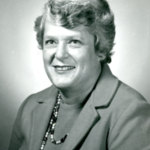Interviewer: Ilona Fry
Interview Date: February 13, 1980
Location: Orzech residence, Corvallis, Oregon
Duration: 0:30:13
In this interview, Miriam “Mimi” Orzech discusses how she found her way to Corvallis. Born in New York City, Orzech’s family eventually settled in Lake Oswego during the Second World War. After completing a degree from UC Berkeley, marrying Ze’ev Orzech, and spending a few years in Northern California, the Orzechs moved to Corvallis. Following the move, Ze’ev Orzech became a professor at Oregon State University and Miriam Orzech was able to be close to her family again.
Orzech began work with the Educational Opportunities Program (EOP) in 1969. With the funding and the political climate of the time in mind, Orzech describes the early years of the EOP. Under the direction of Lonnie B. Harris, Orzech’s position catered to the academic needs of students involved in the program. She served as an academic advisor where she established an academic assistance program consisting of developmental classes and created a tutoring program which later became the Learning Center. She highlights the administrative aspects of the program such as why the EOP was established, who supported it and what it was like to build such a program from the ground up.
Orzech then recalls the difficulties faced by minority students, such as the town being unhospitable and students being made to speak for their entire racial group in their classes (which she notes as a continuing problem). She remarks on the many obstacles she had to face, such as the inherent difficulties in establishing a program like the EOP, the unreceptive professors and administrators, and having bureaucratic red tape surrounding elements like admissions and financial aid.
Orzech became director of the EOP in 1974 and notes that she has since not made any large changes to the program. However, she has worked hard to cultivate the stability of the program through auxiliary resources--like the Learning Center--construct student-professor retreats, and start the initiative to create cultural centers on campus. As she lists her responsibilities as director, she details what she thinks the EOP has done well and where it could improve. Orzech finally comments on the rewarding and varied work of the Educational Opportunities Program.
Dublin Core
Title
Description
Orzech began work with the Educational Opportunities Program (EOP) in 1969. With the funding and the political climate of the time in mind, Orzech describes the early years of the EOP. Under the direction of Lonnie B. Harris, Orzech’s position catered to the academic needs of students involved in the program. She served as an academic advisor where she established an academic assistance program consisting of developmental classes and created a tutoring program which later became the Learning Center. She highlights the administrative aspects of the program such as why the EOP was established, who supported it and what it was like to build such a program from the ground up.
Orzech then recalls the difficulties faced by minority students, such as the town being unhospitable and students being made to speak for their entire racial group in their classes (which she notes as a continuing problem). She remarks on the many obstacles she had to face, such as the inherent difficulties in establishing a program like the EOP, the unreceptive professors and administrators, and having bureaucratic red tape surrounding elements like admissions and financial aid.
Orzech became director of the EOP in 1974 and notes that she has since not made any large changes to the program. However, she has worked hard to cultivate the stability of the program through auxiliary resources--like the Learning Center--construct student-professor retreats, and start the initiative to create cultural centers on campus. As she lists her responsibilities as director, she details what she thinks the EOP has done well and where it could improve. Orzech finally comments on the rewarding and varied work of the Educational Opportunities Program.

